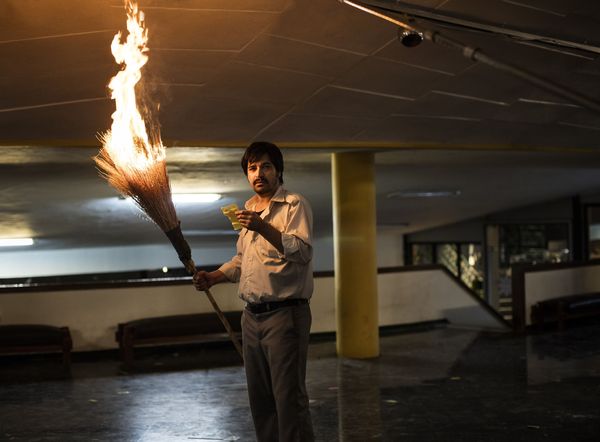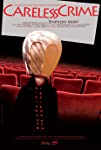Eye For Film >> Movies >> Careless Crime (2020) Film Review
Careless Crime
Reviewed by: Amber Wilkinson

Time doesn't just shift in Shahram Mokri's Iranian drama about a fire at a cinema that killed 478, it also folds like origami and pirouettes, the past and present so close as they dance they can feel each other's breath. The fire really happened, 40 years ago, as the shah stood on the brink, a catalogue of errors adding, like tinder, to the tragedy. Now that period flows into the present day as another group of men decide to take on what they view as the decadence of the moving image and a similar set of careless choices prime the scene.
In the threatened cinema of the here and now another film, Careless Crime, is playing, about soldiers stuck in the desert with a flat tyre and an unexploded missile and the way they cross paths with a group of women who are preparing to watch Masud Kimai's The Deer - the same film that was playing on the night of the arson attack 40 years ago. The very idea of a film within a film within a film - with parts of Harold M Shaw's The Crime Of Carelessness also included in passing - is audacious, as is Mokri and his co-writer Nasim Ahmadpour's mazelike manipulation of time. The film about the soldiers plays out like a fable - the captain goes on a quest of sorts that seems him visit a mysterious old woman, while that dormant missile, of course, is loaded as much with allegory about the present day as it is with explosives. All this twisting and turning requires effort on the part of the viewer but even at its most opaque, Mokri's film remains consistently engaging and he never lets us forget that we, like many characters in his film, are also watching a piece of cinema.

The complexity of the film's structure - which won the best screenplay award in Venice's Orizzonti section - serves to emphasise the banality of evil that is going on. The co-conspirators are an unlikely bunch, including Takbali (Abolfazl Kahani), introduced on the hunt for anti-anxiety medication he is unable to get on prescription. His trip to meet a supplier at a cinema museum, which includes a couple of surreal encounters and a journey into the dark and labyrinthine bowels of the building, clue us in to the fact that this will be no straightforward storytelling. He becomes the hired firestarter of Fallah (Dorani), Yadollah (Behraznia) and Faraj (Sareban) but they are so hapless, Mokri shows how the attack is largely abetted by the smaller 'evils' of others, such as an owner desperate to cram more seats in a cinema or a delivery guy's bad choices, mounting the tension gradually.
Despite the seriousness of the subject matter, there's humour too and a lot of observations about day-to-day existence in Iran, mainly playing out in snapshots of the life of Elham Mansouri (Razieh Mansouri), who chats with her mum about the perils of dating - and difficulties of parking - or converses with friends as she tries to complete the simple, yet seemingly impossible, task of delivery posters to the cinema. Dialogue loops back and forth, sometimes scenes are replayed and messages are sent, as if by magic, from one place to another. It's a neat trick and one that you may well get the urge to watch again.
Reviewed on: 16 Sep 2020















